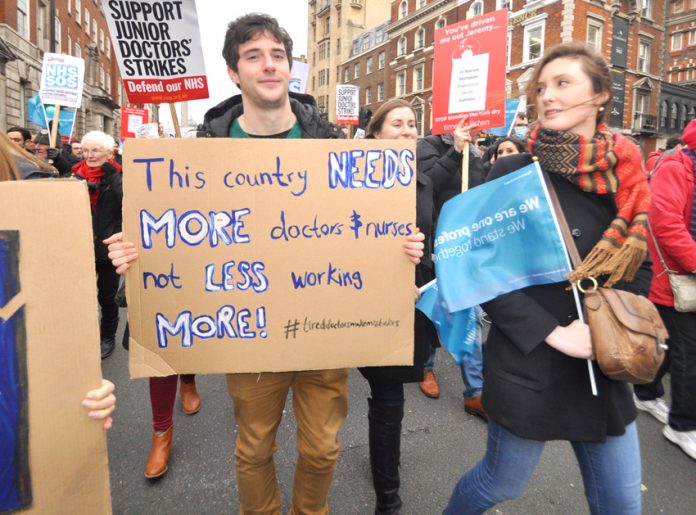
IN his speech to the BMA’s ARM, Dr Mark Porter, BMA council chair, said: ‘The government is in denial. The chancellor says he has a ‘fully funded’ plan for the NHS. But while he announced £10bn of new money in November, our funding report showed the real increase in health spending is less than half that.
‘As for the rest, for the largest part of the unmet need, the plan relies on what he laughably calls “efficiency savings”. ‘We’ve seen those before. They are neither efficient nor are they savings.
‘They are cuts. Year-on-year cuts to funding that have driven almost every acute trust in England into deficit. In total, more than £2bn in deficit, a 20-fold increase in two years. And this pernicious effect permeates every part of the United Kingdom.’
He continued: ‘Junior doctors have never been told why they were singled out. Why they should simply accept a contract that failed to protect them and their patients from unsafe hours. Why they didn’t deserve a contract that treated women fairly.
‘Strikes are always a last resort, particularly for doctors, but we’ll remember how junior doctors made every single one of those days a positive demonstration of why they cared and what they stood for.
‘They showed unity in dispute and – just as importantly – a focus on the need for a negotiated agreement to resolve this dispute. Junior doctors pushed this to the point where they were finally listened to by government. And they were listened to because the government was in no doubt of our unity, our ability to organise, and the support we had from patients and the public.
‘This was the year when a profession that can sometimes revel in its differences came together as never before. SAS doctors, consultants, GPs and medical students supporting junior doctors, covering their work during the industrial action, and saying, as I did on the Today programme, “I would have done the same”.
‘We are one profession. We must remain so. Junior doctors now have a contract offer that would not have been conceivable last October. Following more than a hundred BMA roadshows at which the detail of the offer has been set out, and junior doctors’ concerns heard, our members are now making up their own minds.
‘Whatever happens with any future contract talks, the government has learned it is dealing with a united profession. I hope it has learned how, and how not, to deal with one. Here’s a curious fact. There are more health ministers in England than there are major emergency departments that met the four-hour waiting target. And elective waiting lists are at their highest in almost 10 years.
‘When those hospitals look for support, they are told by their regulator they should cut staff numbers to help balance budgets. The Francis report told hospitals that staff numbers should be based on safe care, not about meeting financial targets. We know what can happen when this advice is ignored.
‘Other cuts are made through a shoddy sleight of hand. The government said it wouldn’t cut health spending in real terms. But it took £200m from the public health budget by saying that promise only applied to the NHS, having put public health outside it. . . Health spending is a political choice, but it’s a choice from which our government is hiding.’
He continued: ‘They can’t conjure seven-day services out of thin air. And to take another tired old mantra – they can’t convince us that privatisation is good for the health service – however much they repeat it. It’s the small matter of the evidence again, you see.
‘All we ask is that they look, listen and learn when millions of pounds have already been wasted on private provision in the health service. Learn from Hinchingbrooke, where a private company took over a troubled hospital, predicting savings that were – in the words of the public accounts committee – “unachievable”. Guess what – they were.
‘Learn from mid-Sussex, where a £235m musculoskeletal contract was handed over to the private sector, and only after that did someone figure out the mortal threat it posed to the local hospital. Learn from Nottingham, where dermatology was transferred to a private provider, but most of the senior staff didn’t follow, harming the service for patients, for years to come.
‘It’s all in our report on privatisation, and so is another question the government has never been able to answer – why private providers don’t face the same requirements to report patient safety incidents and performance as NHS providers. There seems to be a blithe assumption that, just by having shareholders, an organisation can care better for its patients. Well we’ve got a group of shareholders too. It’s every man, woman and child who uses the NHS.’